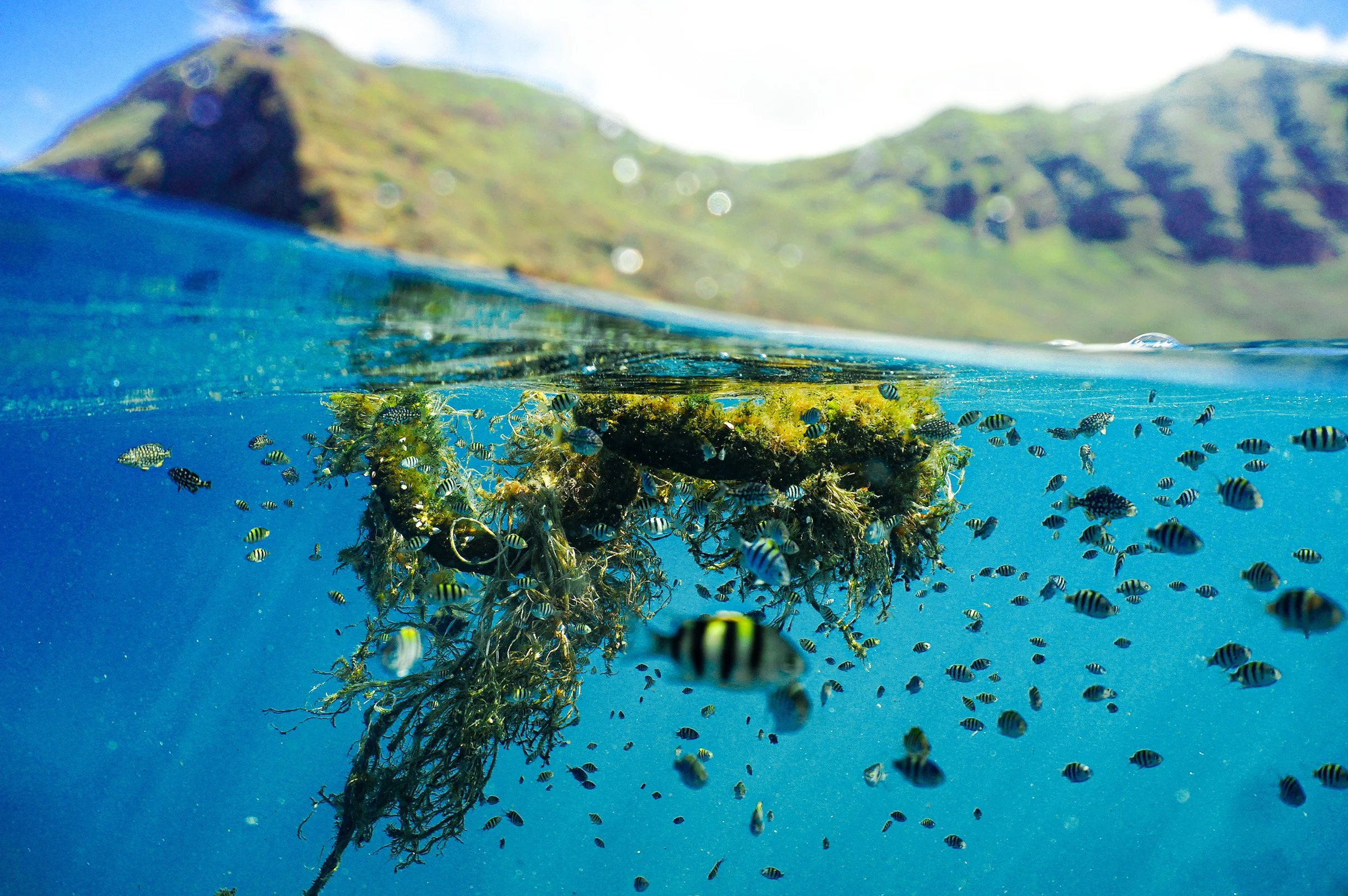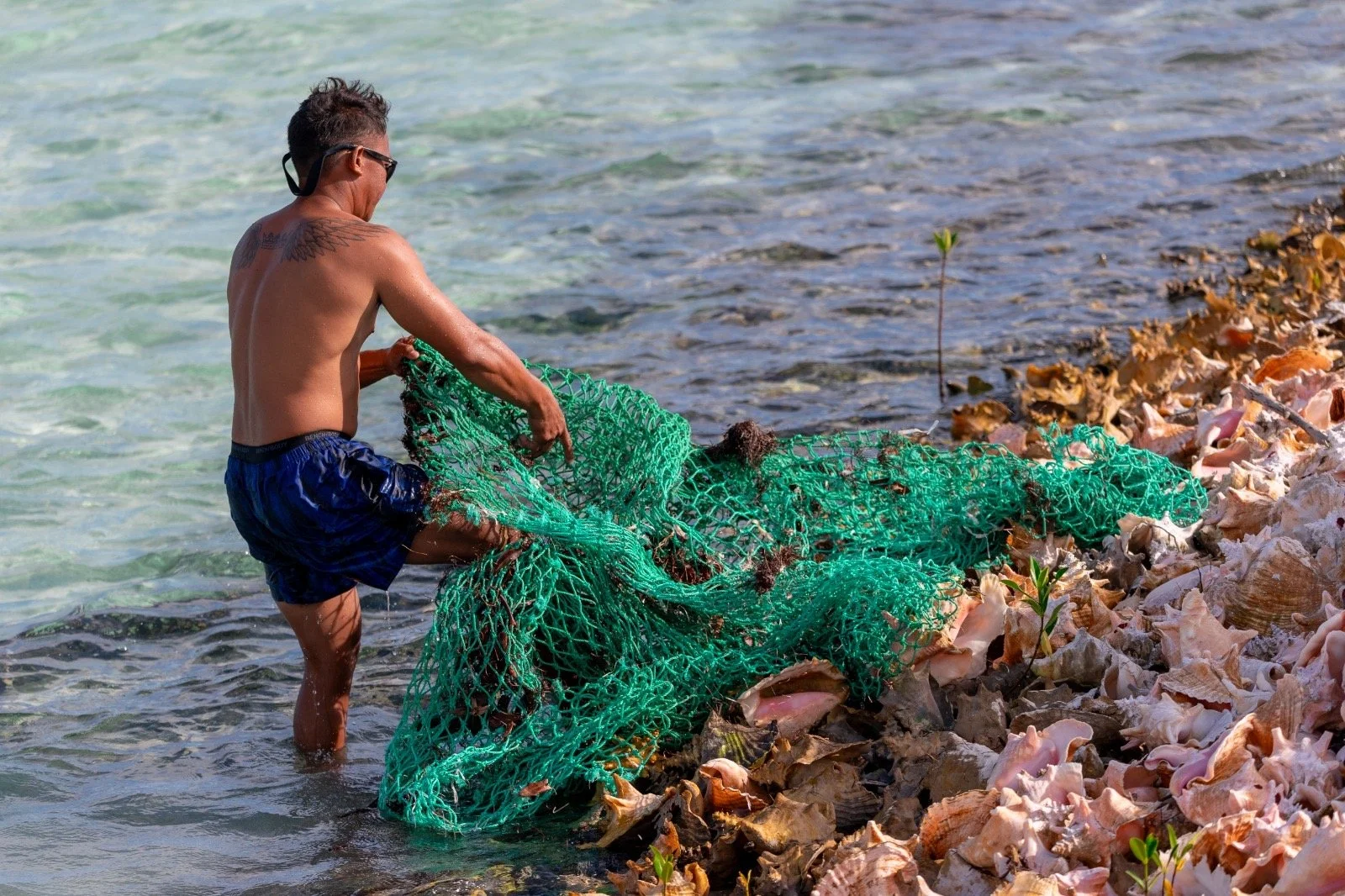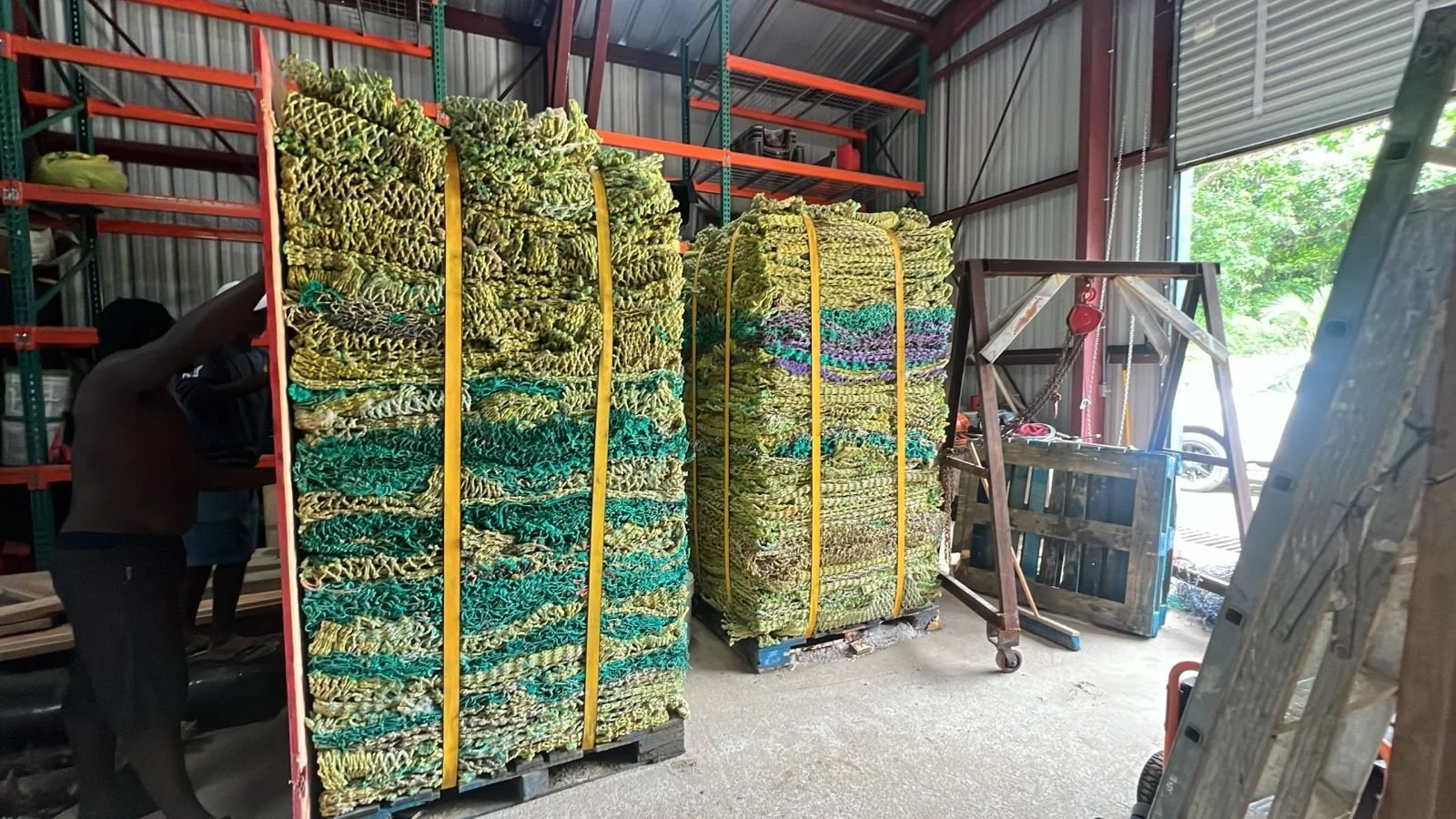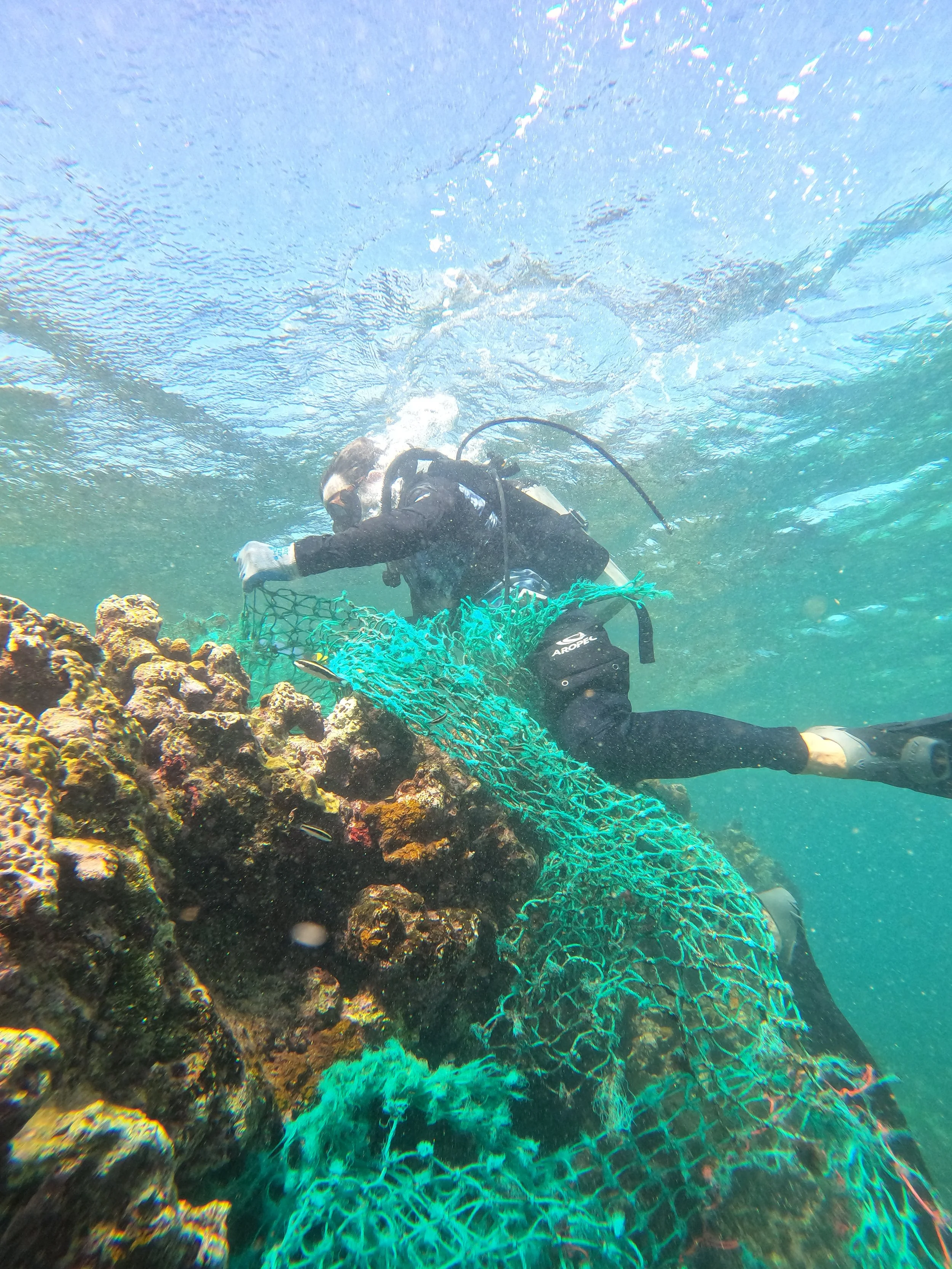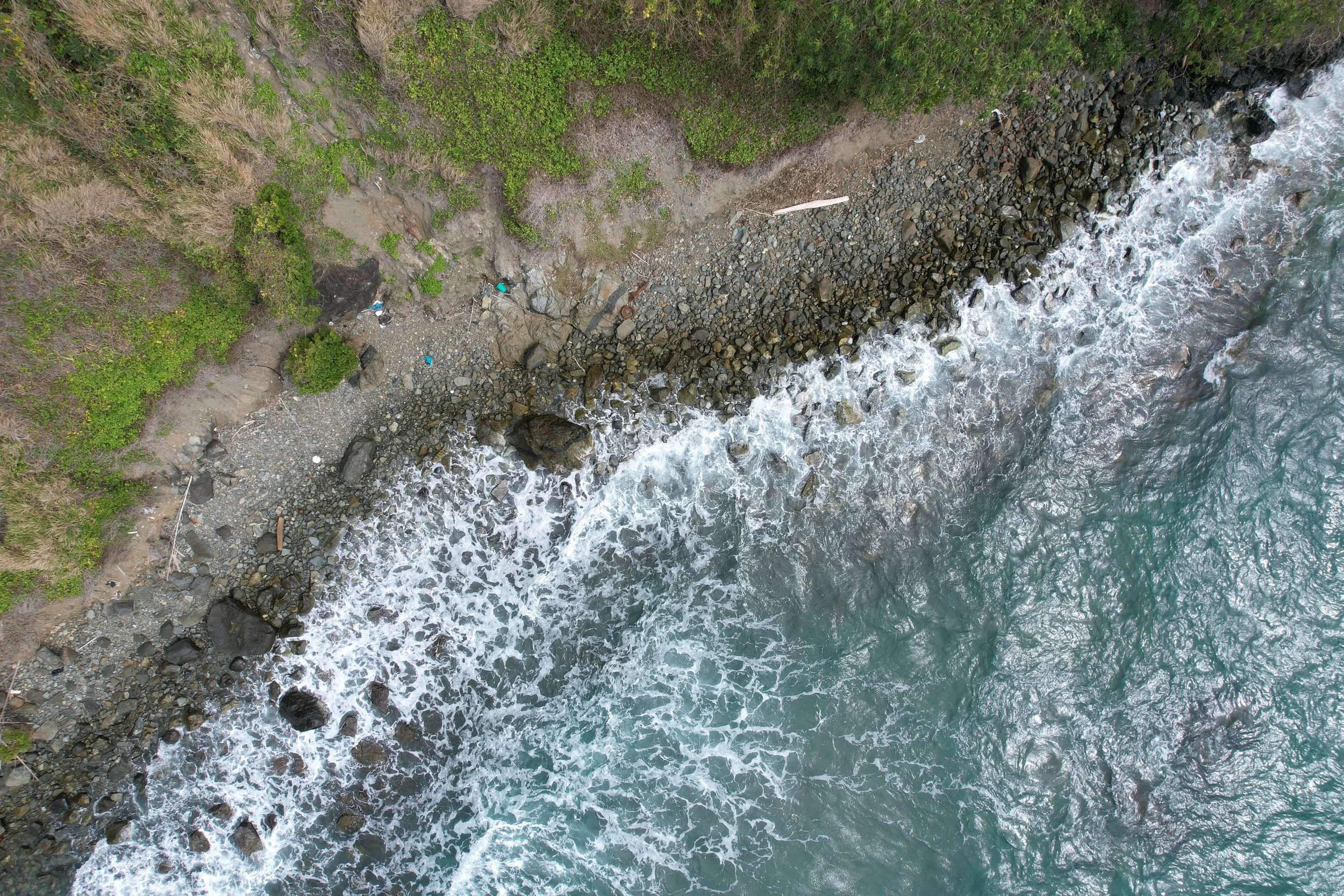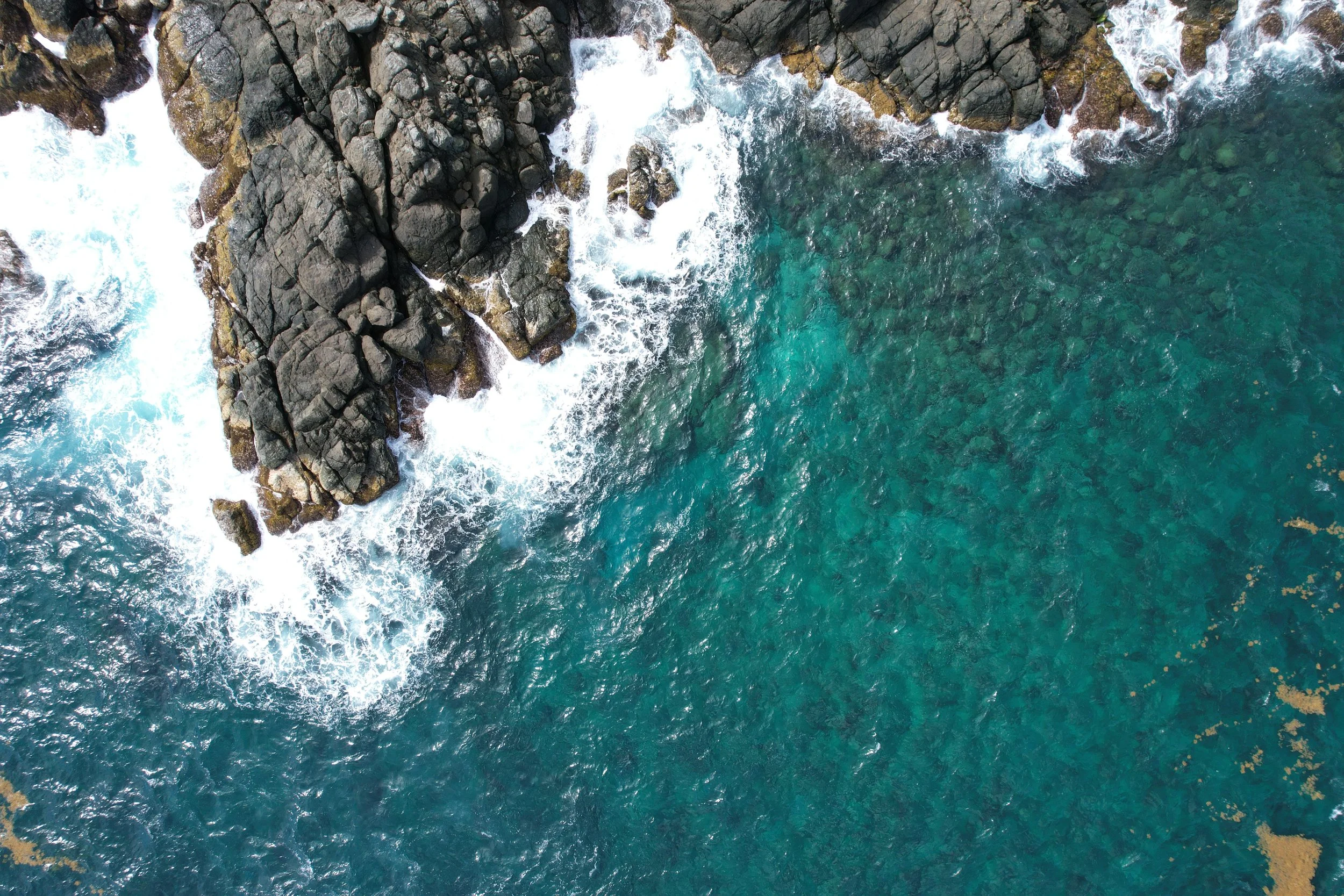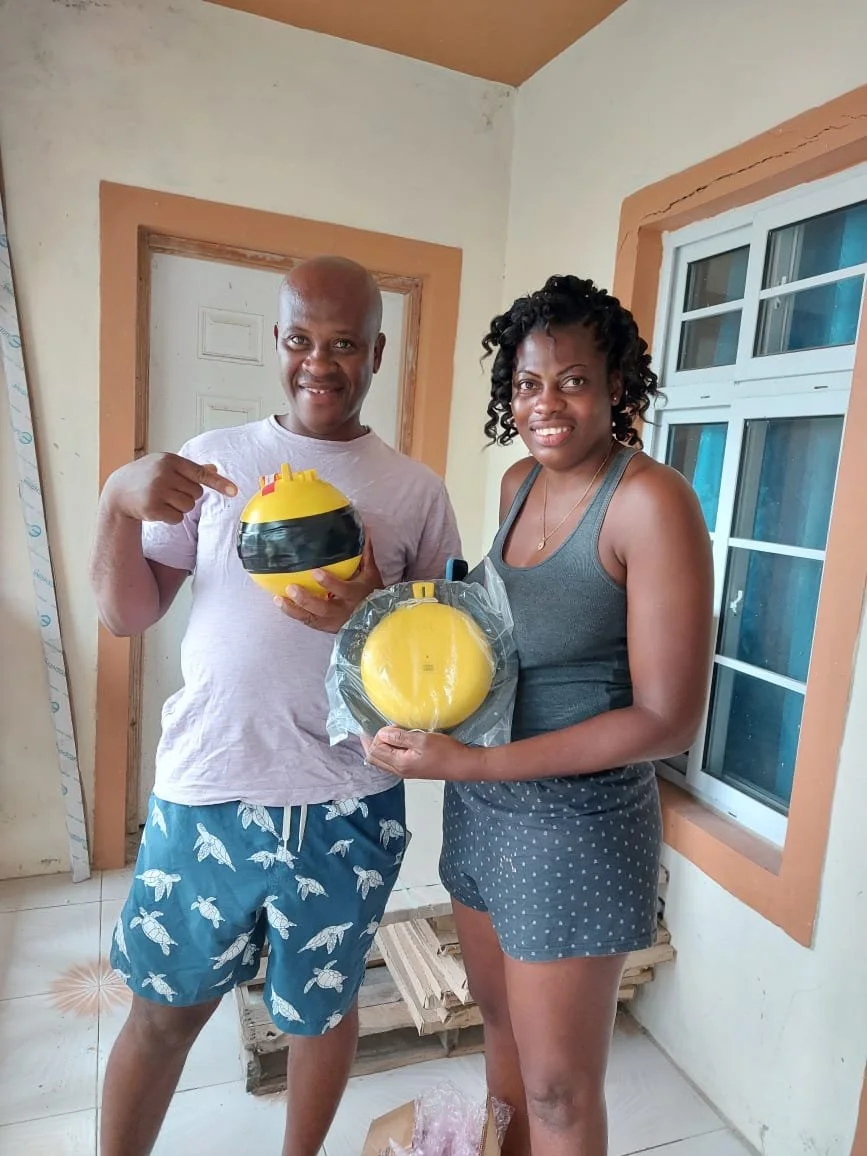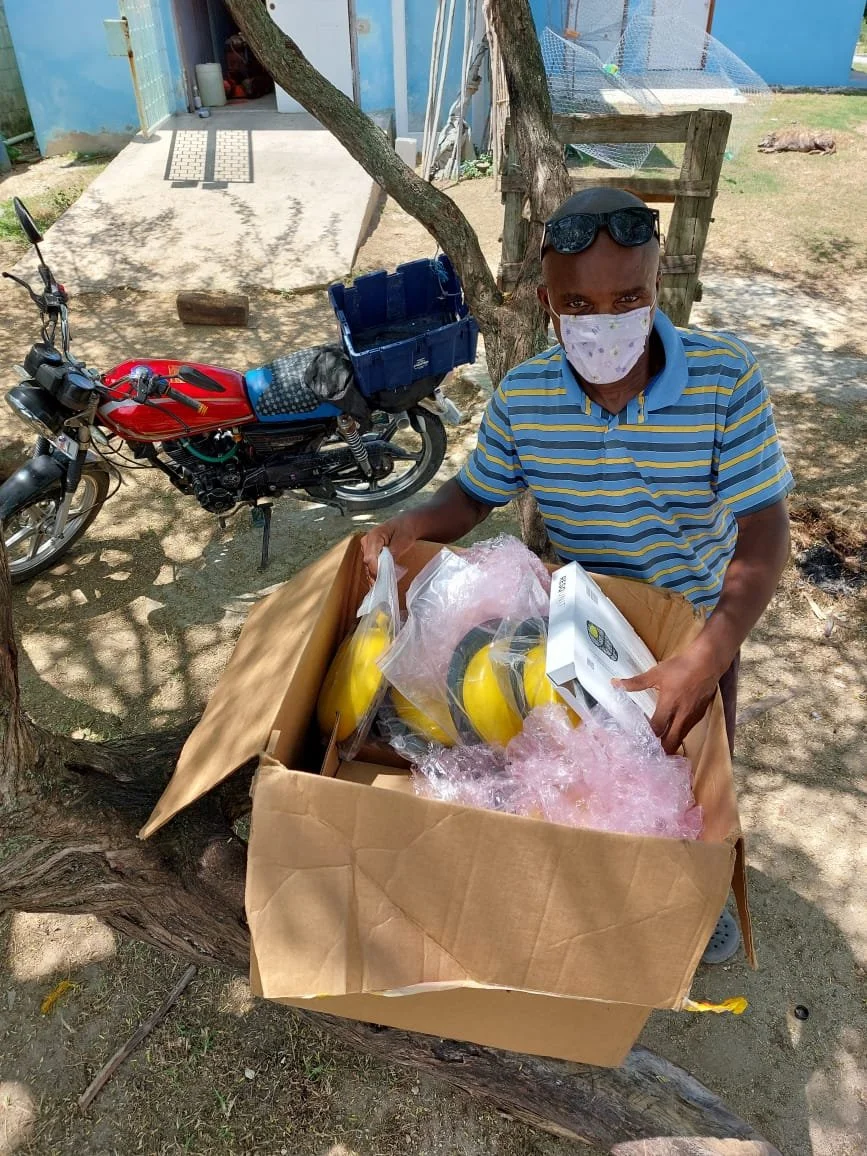GGGI Signature Project - Caribbean
Project Background
Fisheries in the Caribbean represent a way of life for tens of thousands of people, most of whom are involved in small-scale fisheries. In addition, the wider fisheries industry economically and socially supports millions of people in the region. ALDFG can have considerable impact on local commercially harvestable fish populations and the marine ecosystem in general in the Caribbean.
Conversations with local stakeholders indicate that the increased frequency and intensity of major storm systems passing through the region, which are undoubtedly an effect of climate change, is a major cause of gear loss in the region. Coordinated action is essential to prevent, mitigate, and remediate the ghost gear issue in the Caribbean region to ensure the future sustainability of harvestable fish populations and the livelihoods of those who depend upon them, and the overall health of the ecosystem.
The GGGI has been engaging in the Caribbean since 2018, having been an observer and giving presentations on ALDFG at the Caribbean Regional Fisheries Mechanism annual meetings in Montserrat in 2018 and St. Kitts in 2019. The Caribbean region, being prone to frequent severe storm events such as hurricanes, experiences a significant amount of gear loss, particularly in its static gear fisheries using traps and pots. This comprehensive project is focused on two key project objectives in the Caribbean region:
reducing ghost gear by incentivizing adoption of best practices around gear loss prevention, exploring innovative gear designs and improving port reception facilities; and
identifying the types and prevalence of ghost gear in the region and conducting workshops to train local stakeholders in gear marking and retrieval.
Project methodology includes assessing the scope of the ghost gear problem through implementation of fisher surveys, testing new gear tracking technologies, assessing regional end-of-life options for fishing gear, performing lost gear hotspot mapping followed by groundtruthing of gear accumulation areas and targeted retrieval, and including gear management best practices as outlined in the GGGI Best Practice Framework for the Management of Fishing Gear in a parametric disaster insurance product developed by the World Bank. The GGGI has carried out multiple additional streams of work in the Caribbean in collaboration with local partners including:
Gathering data on the causes and rates of gear loss in Caribbean fisheries in Belize, the British Virgin Islands, Grenada, Jamaica, Montserrat and Trinidad and Tobago via fisher surveys;
Creating predictive models on likely locations for ALDFG based on these surveys as well as fisheries effort and atmospheric/bathymetric/oceanographic data overlays;
Trialing gear marking and recovery technology in Jamaica;
Assessing end-of-life gear reception facilities in Caribbean ports;
Performing a clean up of a Jamaican beach including ALDFG debris;
Performing unoccupied aerial vehicle (UAV) surveys of near shore areas to determine the presence of gear to determine the presence of gear and to inform a custom gear detection and machine learning algorithm;
Facilitating ALDFG workshops based on the GGGI Best Practice Framework for the Management of Fishing Gear in Belize and Jamaica and in the margins of the GCFI 74 conference to facilitate reciprocal learning with fishers and find effective local solutions;
Using information gathered from the activities above, drafting a regional action plan for the Caribbean to address ALDFG; and
Collaborating with Cefas UK to test a checklist for a parametric insurance product being developed by Cefas for the World Bank: the trial involves incorporating the GGGI BPF into the checklist to encourage gear recovery ahead of major storm events in order to reduce gear loss and provide countries with lower premiums for natural disaster insurance.
Project Summary
(2024)
The GGGI’s work in the Caribbean continued in 2024, with GGGI member Beyond The Reef (BTR) conducting a series of fisher surveys in the British Virgin Islands using the FAO Global ALDFG survey template. The survey template is designed to facilitate ALDFG data collection through fisher interviews in various countries. This allows for broad, national, regional, and global level analyses to be conducted in an attempt to understand the amount of gear lost around the world each year and what the key drivers for loss are in different geographies. In total, 52 fisher surveys representing hook-and-line, trap, gillnet, and seine fisheries were completed across the islands, providing valuable knowledge about the key drivers for ALDFG in the region.
Building on these survey results, and combining additional available datasets such as fishing effort, bathymetry, wind speed, and so forth, Natural Resources Consultants (NRC) carried out an initial ALDFG predictive model for the British Virgin Islands. The model, completed in May 2024, identifies, at varying levels of probability, where fishing gear is lost and where ALDFG is likely to accumulate in the marine waters of the British Virgin Islands. However, it should be noted that the available data for the British Virgin Islands were comparatively limited, which should be considered when evaluating the results of the model.
Given this, BTR collaborated with NRC to identify five key sites to perform dive surveys to confirm the presence or absence of gear in areas of the model deemed likely to contain gear and to remove whatever gear was found. Additionally, BTR has been carrying out conservation work — including ALDFG survey and recovery — in the British Virgin Islands for several years. Accordingly, they have built up a sizeable collection of data on known locations of ALDFG around the islands, which, combined with the additional five dive surveys carried out in the fall of 2024 and more dive surveys to be carried out in 2025, will be used in collaboration with NRC to refine the predictive model in 2025.
Additionally, the memorandum of understanding (MOU) signed by the GGGI and the Caribbean Regional Fisheries Mechanism (CRFM) in September 2023 has resulted in planning for more focused collaboration about ALDFG between the two organizations. Plans were carried out to host a series of ALDFG webinars focused on the Caribbean region (to be held in early 2025) and to conduct a more focused review and update of the Caribbean ALDFG Action Plan developed in 2021 by the GGGI, CRFM, and Gulf and Caribbean Fisheries Institute (GCFI). The aim of revising the ALDFG Action Plan is to ensure more coordinated efforts across the region to address ALDFG at scale and to ensure that local challenges are taken into consideration when making recommendations on how to address the problem.
Nets being pulled off a reef in the British Virgin Islands. Photo credit: Beyond the Reef.
Net removals in the British Virgin Islands. Photo credit: Beyond the Reef.
Nets being baled for recycling in the British Virgin Islands. Photo credit: Beyond the Reef.
Net removals in the British Virgin Islands. Photo credit: Beyond the Reef.
Project Summary
(2023)
In 2023, we continued our work in the Caribbean, building on our previous work over the last few years. Our work on testing RESQUNIT devices (a combination of escape hatch and emergency recovery buoy) continued in the Jamaican spiny lobster trap fishery. We tested a version of the units that have an electronic timed-release (ETR) mechanism, which allows fishers to set via a smartphone app the exact time they need to have the devices activate a combination of emergency buoy and escape hatch. Jamaican fishers had greatly desired this feature after the previous round of testing, given that they generally only leave their traps out for a short time and the cotton rot cord in the original version of the RESQUNIT device took too long to biodegrade in the marine environment to be useful in this fishery. The feedback on the ETR version was well received, and it was a marked improvement on the previous generation of biodegradable rot cord activated RESQUNIT devices.
We also partnered with Wolf Fish Ltd. to conduct additional unoccupied aerial vehicle (UAV) surveys in the waters around Trinidad and Tobago to detect ALDFG in near-shore coastal environments and use the aerial imagery to train an artificial intelligence algorithm to detect and geolocate ALDFG. This complements similar work we have done with Wolf Fish in Belize, Greece, Jamaica, and Myanmar. Our long-term aspiration is to create an accessible online portal where UAV operators around the world can use the methodology developed in these projects to capture imagery from coastal environments with shallow (~12 meter) water and low turbidity and upload the imagery to have an AI algorithm identify ALDFG, geolocate it, and send it to our data portal.
Additionally, we partnered with the University of the West Indies to carry out fisher surveys created by UN FAO to determine the main causes and drivers of gear loss in Trinidad and Tobago. We have carried out these surveys in other regions of the Caribbean in the past, namely in Belize, the British Virgin Islands, Grenada, Jamaica, and Montserrat. Together, these surveys will help establish a baseline of gear loss in the region to help inform ALDFG predictive models that we have been working on in collaboration with Natural Resources Consultants. These models are designed to help fisheries managers in each location better understand the ALDFG situation and causes on the ground in the hope of finding ways to prevent gear loss, improve the health of coastal ecosystems, and increase the productivity of local fisheries. Information gleaned from these models will also help inform the further development of the Caribbean Regional ALDFG Action Plan we have created with input from the Caribbean Regional Fisheries Mechanism (CRFM).
Aerial imagery for use in training AI model. Photo credit: Aerial Recon and Recovery Initiative.
Aerial imagery for use in training AI model. Photo credit: Aerial Recon and Recovery Initiative.
Project Summary
(2022)
In 2022, the GGGI—with funding from the Government of Canada’s Ghost Gear Fund and in collaboration with the Gulf and Caribbean Fisheries Institute (GCFI) —carried out several activities in the Caribbean, building on our work in previous years.
In collaboration with the Government of Montserrat and Natural Resources Consultants (NRC), we completed an ALDFG predictive model for Montserrat. Using data collected by the Fisheries and Ocean Governance department of Montserrat through the implementation of fisher surveys provided by the United Nations Food and Agricultural Organization (UN FAO), and also using additional data sets analyzed by NRC, a heat map and accompanying narrative report were generated outlining the most likely areas for gear loss around the island of Montserrat. This model will be used by the Fisheries and Ocean Governance department to better understand the key causes of gear loss and to implement preventative measures to minimize future gear loss and the resulting impacts on local fisheries.
Building on the successful unoccupied aerial vehicle (UAV) surveys the GGGI undertook in Jamaica in 2021, we expanded this work to include surveys in Trinidad and Tobago. Using proprietary methodology developed by Wolf Fish Ltd., we gathered aerial survey data and imagery to further refine the GGGI’s machine learning algorithm to auto-detect ALDFG in near-shore coastal environments. Complementary to this, we engaged the University of the West Indies to conduct UN FAO fisher surveys in both Trinidad and Tobago to obtain a better understanding of the key causes of gear loss across both islands. In 2023, we will use the results of both sets of surveys to engage NRC to produce an ALDFG predictive model for Trinidad and Tobago, similar to the model created for Montserrat, to better inform fisheries management policies.
Building on our previous work in Jamaica testing innovative new gear technologies, we engaged with our local partner—the Jamaica National Fisheries Authority—and with Resqunit to test the company’s new electronic timed release (ETR) version of its proprietary combination escape hatch and emergency retrieval buoy for pots/traps. Feedback from fishers who participated in the initial round of testing indicated that the technology worked very well but that the original biodegradable cotton “rot cord” that held the buoy in place took too long to biodegrade and trigger the device. The ETR units, however, can be programmed to deploy at a set time, which could be hours, days or weeks after the trap is set. Unfortunately, COVID-19-related production delays pushed the on-the-ground testing into 2023.
Together with GCFI, we plan to co-host a virtual workshop in early 2023 on EOL solutions for fishing gear in the Caribbean region. The workshop will focus on alternative means of disposal that are more realistic and well-suited to the Caribbean context. The workshop will be informed by the draft ALDFG action plan the GGGI created as a result of our work in the wider Caribbean region, which identified that there have been very few “traditional” options—such as recycling—for EOL gear.
Additionally, in collaboration with GCFI and the Caribbean Regional Fisheries Mechanism (CRFM), the GGGI developed a draft Regional ALDFG Action Plan for the Caribbean region. The action plan—based on the GGGI Best Practice Framework for the Management of Fishing Gear and information that the GGGI has carried out in the Caribbean since 2018—was targeted at fishers and fisheries managers to provide guidance on best practices to avoid gear loss during fishing operations and to inform future fisheries management decisions. The draft document underwent a round of feedback from stakeholders across the Caribbean region, facilitated by GCFI and CRFM, to ensure that recommendations in the action plan were appropriate. One of the key observations identified during the creation of the document—and confirmed by the GGGI’s work in the region to date—was that there are substantial differences in the causes of gear loss across different countries in the region, which makes it challenging to create a regional document that remains applicable to all actors. The GGGI will continue working with stakeholders in the region—including GCFI, CRFM, member states and others—to refine the action plan over time and ensure it remains comprehensive and fit for the purpose.
Fisher testing RESQUNIT device in Jamaica. Photo credit: Jamaica National Fisheries Authority.
Fishers testing RESQUNIT devices in Jamaica. Photo credit: Jamaica National Fisheries Authority.
Fishers testing RESQUNIT devices on spiny lobster traps in Jamaica. Photo credit: Jamaica National Fisheries Authority.
Fishers testing RESQUNIT and Blue Ocean Gear Smart Buoy devices in Jamaica. Photo credit: Jamaica National Fisheries Authority.
Project Summary
(2021)
The GGGI held initial conversations with fish harvesters in the region via two virtual workshops carried out by the GGGI in July 2021 in Jamaica and Belize respectively and a follow up virtual workshop in the margins of the GCFI conference in November 2021.
In 2021, the GGGI held three virtual capacity building workshops for fishers in Jamaica, Belize, and the wider Caribbean region at GCFI 74 to educate fishers and fisheries managers in the region about the effects of ALDFG and to promote effective strategies for ALDFG prevention, mitigation, and remediation based on the GGGI C-BPF. These workshops were also excellent opportunities to learn more about the levels of awareness of ALDFG issues from Caribbean fishers and about the primary causes of gear loss, which varied significantly from country to country, even when gear and harvesting species were similar or the same.
In addition, we tested two gear loss prevention/mitigation technologies in Jamaica. Twenty-three Smart Buoy devices by Blue Ocean Gear and 96 Resqunit devices are being tested in Jamaica’s spiny lobster fishery, where the devices are attached to Antillean Z-traps. Our primary partner on the ground, the Jamaica National Fisheries Authority (NFA), distributed the gear to trusted fishers across the island in parishes representing the full range of marine conditions on all coasts. During the trial, NFA is collecting feedback from fishers on the efficacy of each technology.
We also conducted UAV surveys in near-shore coastal environments in two locations around Jamaica to detect ALDFG, specifically Antillean Z-traps used for catching spiny lobster. The UAV flights were performed by David Schwapp of Schwapp Technical Laboratories (STL) using a methodology developed by Dr. Sol Milne of Wolf Fish Ltd. This continues our work from Myanmar in 2019, with images from the UAVs being used to develop and train a machine learning program to detect ALDFG from aerial imagery. Initial analysis by Dr. Milne indicates that the machine learning model can recognize active as well as derelict traps with 80.86 % accuracy. Including additional images can improve the accuracy, and it is something we will continue to do as opportunities arise.
(2020)
Courtesy of funding from the U.S. Department of State and the Government of Canada, and in partnership with the Gulf and Caribbean Fisheries Institute (GCFI), the GGGI continued its work in the Caribbean – specifically Jamaica, Grenada and Belize – conducting fisher surveys with local partners on the ground to gather information on gear loss causes and rates in the region, and assessing local recycling and re-use options for end-of-life gear. Gear tracking technology trials for lobster traps with ResqUnit and Blue Ocean Gear were also set to happen in 2020 in the margins of a workshop in Jamaica; however, restrictions due to COVID-19 pushed this work into 2021.
(2019)
In 2019, we completed the incorporation of the relevant sections of the BPF into the COAST parametric insurance checklist and conducted fisher surveys in both Jamaica and Grenada in concert with the local fisheries authorities. The remaining objectives are due to be carried out in 2020, including: Implementing relevant BPF recommendations as part of an integrated checklist for the COAST risk parametric insurance product for the Caribbean region; Assessing opportunities for improving port reception facilities for lost and/or end-of-life gear and scope for local recycling options; Performing a trial of innovative fishing gear and gear marking technologies to prevent ghost gear and facilitate gear recovery; Gathering information from the most prevalent types of ghost gear in Jamaica and Grenada, and using this information to develop a standardized gear retrieval protocol for the region; Based on data collected through fisher surveys, performing a hotspot analysis to predict the most likely areas for lost gear accumulation and perform ground-truthing to identify areas for future gear removal operations; Conducting workshops with key local stakeholders to share best practices for gear marking and gear retrieval protocols.
(2018)
In 2018, the GGGI began the first phase of its Caribbean work focused in Jamaica and Grenada with funding from the US Department of State in collaboration with the UK Centre for Environment, Fisheries and Aquaculture Science (Cefas) and the local fisheries authorities. The goal of the project was to provide added incentive to Caribbean Small Island Developing States to minimize the occurrence and impact ALDFG in extreme weather events. The project sought to implement best practices such as gear marking, as established in the GGGI’s Best Practice Framework for the Management of Fishing Gear; develop processes for fishers to recover deployed gear prior to extreme weather events; and explore innovative gear designs to limit ghost fishing potential when gear is lost.
Several countries were considered for the initial pilot, including Jamaica, Dominica, Grenada, Belize and St. Lucia. The project efforts focused on effectively integrating the Best Practice Framework for the Management of Fishing Gear into the emerging Caribbean Oceans and Aquaculture Sustainability climate risk parametric insurance checklist, and then test those best practices in two countries in the region poised as early adopters of parametric insurance products. Follow up workshops were conducted with fishers and other stakeholders to share best practices and results and, in the case of gear retrieval, initiate dives to recover ALDFG where possible.
Project partners
Partners
Belize Fisheries Department
Beyond the Reef
Blue Ocean Gear
Caribbean Regional Fisheries Mechanism
Gulf and Caribbean Fisheries Institute
Jamaica National Fisheries Authority
Natural Resources Consultants
RESQUNIT
Wolf Fish Ltd.
Funders
Government of Canada Ghost Gear Fund
Government of the United States of America Department of State

